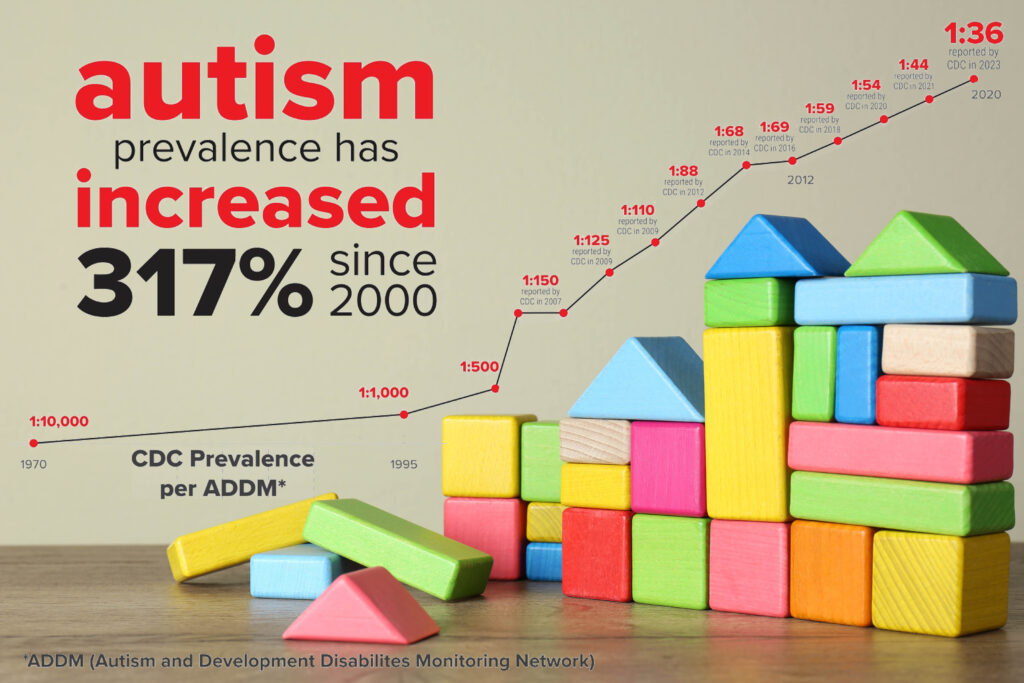Navigating the Surge in Autism Diagnoses in the US and UK and Charting the Course for Inclusive Care
As a team of board-certified behavior analysts operating within the complex and ever-evolving landscape of autism spectrum disorder (ASD) in the United States, we are deeply immersed in the nuanced realities that accompany the diagnosis and treatment of autism. Our perspective is informed by our extensive clinical experience, ongoing education, and the latest research findings in the field.
The recent surge in autism diagnoses both in the UK and the US is a phenomenon that has captured our professional attention and concern. In the United Kingdom, there has been an astounding 787% increase in autism diagnoses from 1998 to 2018. This exponential rise in diagnoses is not isolated to the UK; in the United States, there has been a notable increase in the prevalence of ASD among adults, particularly among Medicaid enrollees, where prevalence nearly doubled from 4.2 per 1,000 in 2011 to 9.5 per 1,000 in 2019. These figures reflect a broader trend that we, as behavior analysts, are observing in our work: autism is becoming more commonly diagnosed across all ages, and the spectrum of those diagnosed is broadening.
The reasons behind this significant increase in diagnoses are multi-faceted. Enhanced awareness and understanding of ASD, both within the medical community and the general public, have played a critical role. The expansion of diagnostic criteria and the recognition of autism in populations previously overlooked, such as women, girls, and older adults, have contributed to more individuals receiving diagnoses. These changes reflect a positive shift towards inclusivity and recognition of the diverse manifestations of autism.
However, this rise in diagnoses also raises complex questions about overdiagnosis and the boundaries of the autism spectrum. The concept of neurodiversity and the movement towards recognizing and celebrating differences rather than pathologizing them have influenced how we, as clinicians, approach autism. Yet, as the spectrum broadens, we find ourselves grappling with the implications of diagnosing individuals who may have previously been considered neurotypical but exhibit traits associated with ASD.
From our vantage point in the field, the most pressing issue is not solely the increase in diagnoses but the critical need for support and services that address the unique needs of individuals on the autism spectrum. The disparities in access to diagnostic services, particularly for adults and underserved populations, highlight the necessity for a more inclusive and comprehensive approach to autism care. Furthermore, the shifting demographics of the autism community, with a notable decrease in the percentage of individuals with ASD who also have intellectual disability, underscores the importance of tailored interventions that cater to a wider range of needs and abilities.
Our focus is increasingly on how we can best support individuals with ASD to lead fulfilling lives. This entails not just diagnosing autism but providing ongoing support, education, and interventions that are responsive to the individual’s needs, strengths, and challenges. The intersection of autism with mental health, education, employment, and social integration presents complex challenges that require a multifaceted and compassionate approach.
As behavior analysts, we are committed to advancing our understanding of autism through evidence-based practice, research, and advocacy. We recognize the importance of viewing autism within the broader context of neurodiversity and are dedicated to supporting individuals with ASD in achieving their potential. The rise in autism diagnoses calls for a renewed commitment to providing comprehensive and person-centered care, enhancing public awareness, and advocating for policies that support the autism community.
The landscape of autism is dynamic and complex. As professionals in the field, we are continually adapting to these changes, striving to balance the nuances of diagnosis with the imperative to provide meaningful support. Our ultimate goal is to contribute to a society where individuals with ASD are understood, valued, and supported to lead lives that are enriching and fulfilling.

